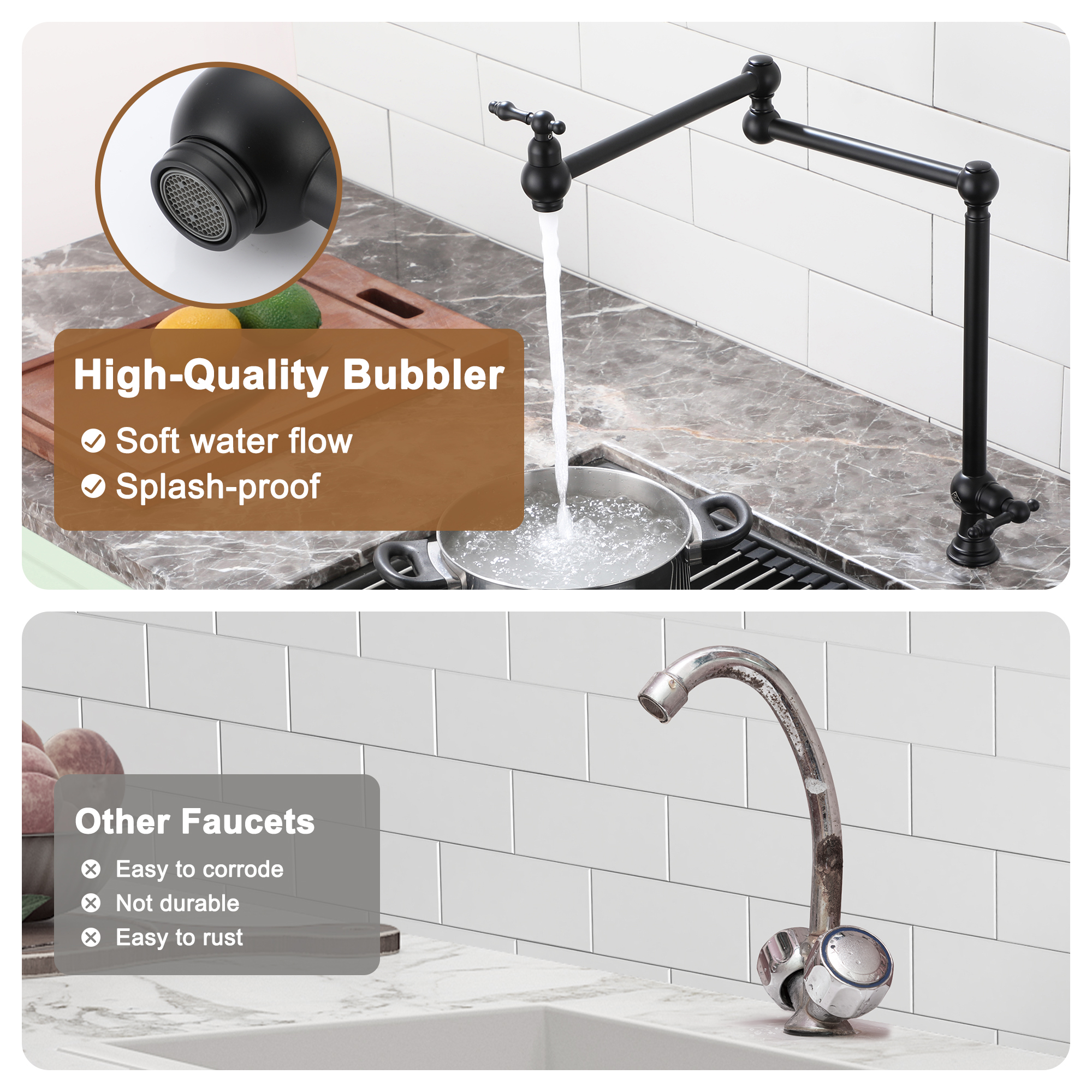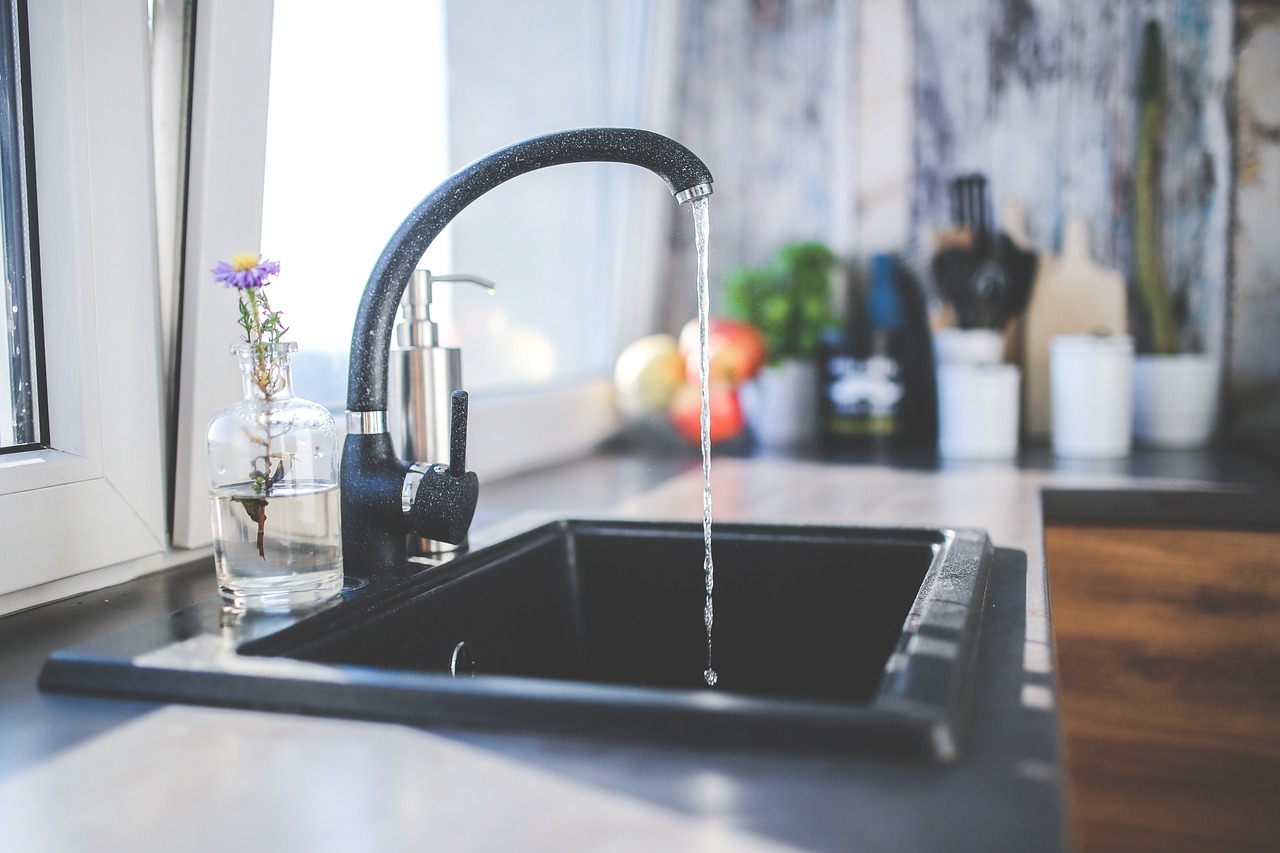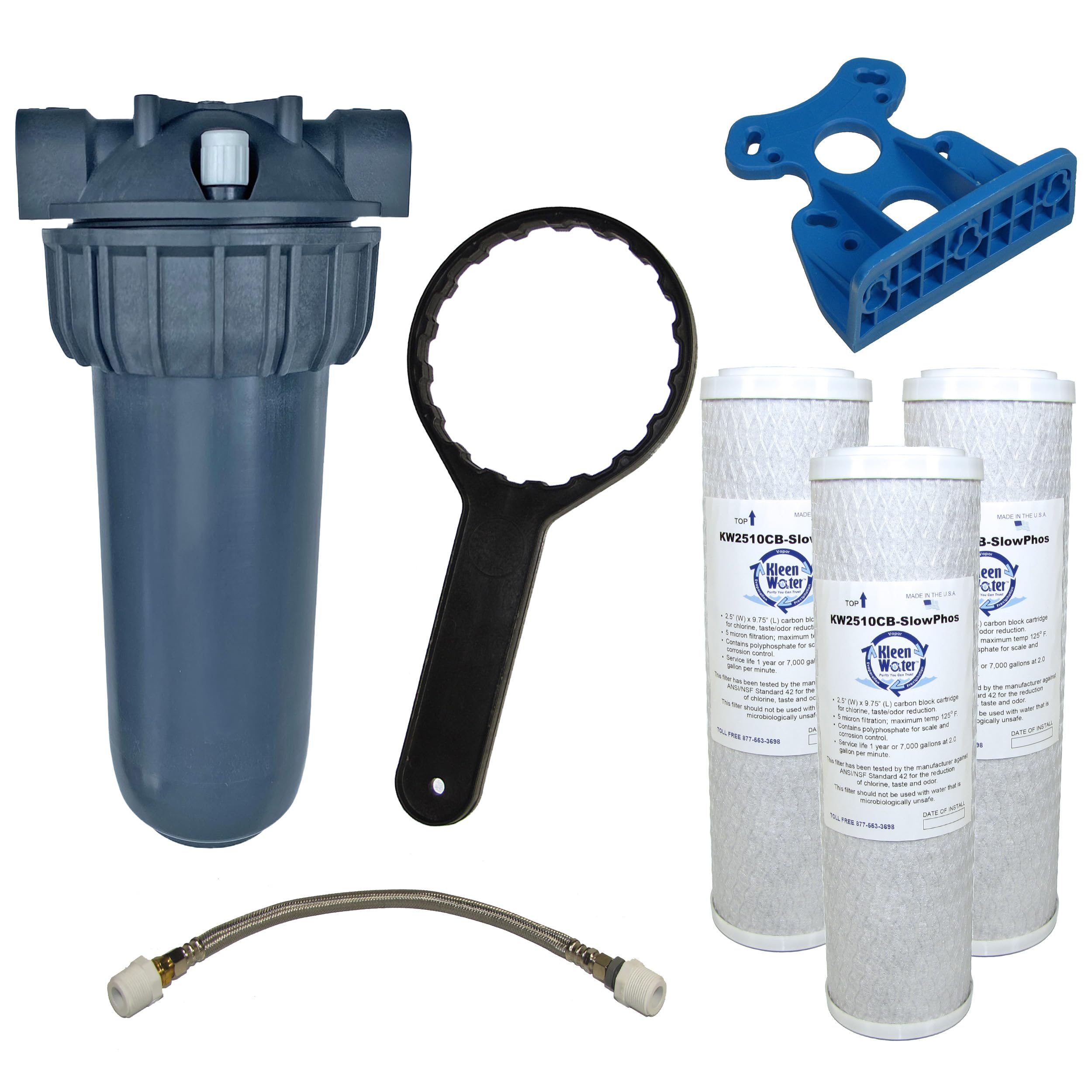Your kitchen sink water is not soft because it contains minerals. These minerals, like calcium and magnesium, make the water hard.
Hard water is standard in many households. It can affect cleaning, taste, and even your appliances. Soft water, on the other hand, is free of these minerals, making it gentler on your skin and at home. Understanding why your kitchen sink water is hard can help you find the right solution.
This blog post will discuss the reasons behind hard water in your kitchen sink. This will help you understand the difference between hard and soft water and what you can do about it. So, let’s move and discover why your kitchen sink water is not smooth.
Water Hardness Basics
Understanding why your kitchen sink water is not soft starts with grasping the basics of water hardness. Water hardness refers to the level of dissolved minerals in your water supply. It directly affects your water’s quality and usability.
Characteristics Of Hard Water
Hard water contains high levels of minerals. These minerals mainly include calcium and magnesium. Some key characteristics of hard water are:
- Soap scum on sinks and bathtubs
- Spotty dishes after washing
- Mineral buildup in pipes and appliances
- Reduced lather from soaps and shampoos
These signs indicate that your water is hard and not soft.
Common Minerals In Hard Water
Hard water typically contains several common minerals. These minerals can vary based on your local water source. Below is a table showing the primary minerals found in hard water:
| Mineral | Description |
|---|---|
| Calcium | Calcium builds up as scale in pipes and appliances. |
| Magnesium | Magnesium causes soap scum and reduces soap effectiveness. |
| Iron | Iron leads to rusty stains on sinks and laundry. |
| Manganese | Manganese causes black or brown stains. |
These minerals are the main culprits behind water hardness. They make the water in your kitchen sink less effective for cleaning and other purposes.

Credit: casainc.com
Identifying Hard Water
Hard water is a common issue in many households. It affects many aspects of daily life. Understanding whether your kitchen sink water is hard can help solve many problems. Hard water contains high levels of minerals, such as calcium and magnesium, which cause various issues in your home.
Signs Of Hard Water
Identifying hard water can be simple if you know what to look for. Here are some common signs:
- Soap scum: Soap does not lather well and leaves a film.
- Scale buildup: White or gray deposits on faucets and sinks.
- Dry skin and hair: Hard water can make your skin and hair feel dry.
- Stiff laundry: Clothes feel rough and look dingy after washing.
If you notice these signs, your kitchen sink water might be hard. Hard water can affect your daily chores and the lifespan of your appliances.
Testing Water Hardness
Testing water hardness is essential to confirm if you have hard water. Here are two simple methods to test your water:
- Soap test:
- Fill a clear bottle with water from your kitchen sink.
- Add a few drops of liquid soap.
- Shake the bottle well.
- If the water forms suds easily, your water is soft.
- Your water is hard if it remains cloudy or forms a few suds.
- Water hardness test kit:
- Purchase a water hardness test kit from a hardware store.
- Follow the instructions provided in the kit.
- Compare the results with the hardness scale included in the kit.
Testing your water hardness is simple and can help you understand the issue better.
Sources Of Hard Water
Have you ever wondered why your kitchen sink water isn’t soft? The answer might lie in the sources of hard water. Hard water contains high levels of minerals, mainly calcium and magnesium. These minerals come from various sources and make your water hard. Let’s explore two primary sources: groundwater and municipal water supply.
Groundwater Sources
Groundwater is a common source of hard water. Rainwater seeps into the ground and passes through layers of soil and rock, which contain minerals like calcium and magnesium. As the water moves, it dissolves these minerals and carries them along, making the water hard. Homes relying on wells often have hard water due to these natural processes.
Municipal Water Supply
Municipal water supplies can also contain hard water. City water comes from rivers, lakes, and reservoirs. Before reaching your home, this water undergoes treatment. Despite treatment, it might still have minerals. The presence of calcium and magnesium makes the water hard. This is why even city water can be hard.
Effects On Kitchen Sink
Hard water in your kitchen sink can cause several issues. These problems affect your plumbing, dishes, and appliances. Understanding these impacts can help you find solutions and improve your kitchen’s functionality.
Impact On Plumbing
Hard water contains high levels of calcium and magnesium. These minerals can build up in your pipes over time. This buildup can lead to clogs and reduced water flow. It may also cause your plumbing to wear out faster.
Regular maintenance and cleaning become necessary to prevent serious issues. Hard water can also affect your water heater, making it less efficient. This can increase your energy bills and reduce the heater’s lifespan.
Residue On Dishes And Appliances
Hard water leaves a residue on your dishes after washing. This residue can make your dishes look dirty even after cleaning. It can also leave spots and streaks on glassware and utensils.
Appliances like dishwashers and coffee makers can also suffer. Mineral buildup can decrease their efficiency and lead to frequent repairs, which can shorten the lifespan of kitchen appliances. Regular descaling can help, but it is not a permanent solution.
Health Implications
Hard water in your kitchen sink can have several health implications. It contains high levels of minerals like calcium and magnesium, which can affect your skin, hair, and even your health when ingested. Understanding these effects is crucial for maintaining your well-being.
Skin And Hair Effects
Hard water can dry and itchy your skin. Its minerals strip away natural oils, leaving your skin feeling rough and irritated.
For your hair, hard water can be harsh, too. It can make your hair feel dry and brittle. Your scalp may also become itchy and flaky. Over time, you might notice more hair breakage and dullness.
Potential Ingestion Risks
Drinking hard water can have some risks. High calcium levels can lead to kidney stones, and magnesium in excess can cause digestive issues like diarrhea.
Hard water may also affect the taste of your food and drinks. The minerals can alter the flavor, making it less pleasant. Over time, these minerals can build up in your pipes. This can lead to potential plumbing issues and increased maintenance costs.

Credit: blog.enduramaxx.co.uk
Water Softening Solutions
Understanding why your kitchen sink water is not soft can be frustrating. Fortunately, effective water softening solutions are available. These solutions help reduce the hardness of your water, making it more suitable for daily use. Let’s explore some of the most popular options.
Water Softener Systems
Installing a water softener system is a common choice. These systems use ion exchange to remove minerals like calcium and magnesium. This results in softer water. Here are some types of water softener systems:
- Salt-based water softeners: Traditional systems use salt to remove hardness.
- Salt-free water conditioners: These systems use a different process. They condition the water without adding salt.
- Dual-tank water softeners are ideal for large households. These systems have two tanks to ensure a continuous supply of soft water.
Each of these systems has its own pros and cons. For instance, salt-based systems are very effective but require regular maintenance. Salt-free conditioners are easier to maintain but may not be as effective for hard water.
Alternative Methods
If you prefer not to install a water softener system, alternative methods exist. These methods can also help you achieve softer water:
- Vinegar: When washing dishes, add vinegar to the rinse cycle. This can help reduce water spots and make the dishes cleaner.
- Baking Soda: Mix baking soda with your dish soap. This can help soften the water and improve cleaning efficiency.
- Boiling Water: Boil water to precipitate out some of the hardness minerals. Let it cool and use it for cleaning tasks.
These methods are simple and cost-effective. They may not be as powerful as a dedicated system, but they can make a noticeable difference. Experiment with these solutions to see which works best for you.
Maintenance Tips
Proper kitchen sink maintenance is essential for ensuring high water quality. Hard water can cause issues like mineral buildup and staining. Here are some maintenance tips for keeping your kitchen sink in top condition and ensuring soft water.
Regular Cleaning
Keeping your kitchen sink clean helps maintain soft water. To wipe down the sink, use a mild cleaner and a soft cloth. Avoid harsh chemicals, as they can damage the sink’s surface.
Follow these steps for regular cleaning:
- Wet the sink with warm water.
- Apply a mild cleaner.
- Scrub gently with a soft cloth.
- Rinse thoroughly with water.
- Dry with a clean towel.
Preventing Mineral Buildup
Mineral buildup is a common problem with hard water. It can affect your sink’s appearance and functionality. To prevent this, follow these tips:
- Use a vinegar solution to dissolve minerals.
- Install a water softener system.
- Regularly check and clean the faucet aerators.
- Wipe down the sink after each use.
| Method | Frequency |
|---|---|
| Vinegar Solution | Monthly |
| Water Softener System | Annually |
| Faucet Aerators | Quarterly |
| Wiping Sink | Daily |
By following these maintenance tips, you can ensure your kitchen sink remains in excellent condition. Regular cleaning and preventing mineral buildup are key to maintaining soft water.
Cost Considerations
Cost considerations are crucial when deciding on water treatment solutions. Understanding the expenses and savings can help make an informed choice. Let’s delve into the costs involved.
Installation Expenses
Installing a water softener involves initial setup costs. You need to buy the equipment, which varies in price. Basic models cost less, while advanced systems are pricier. Professional installation adds to the expense. Hiring a plumber ensures proper installation. This avoids potential issues and further costs. Some might opt for DIY installation. Yet, it’s not recommended for those without experience. Incorrect setup can lead to more problems.
Long-term Savings
Though initial costs are high, long-term savings are significant. Soft water reduces wear on appliances. This extends their lifespan and lowers repair costs. You will use less soap and detergent. This decreases your household expenses over time. Soft water prevents scale buildup in pipes. This reduces plumbing maintenance costs. The benefits of soft water outweigh the initial investment.

Credit: www.amazon.com
Frequently Asked Questions
What Causes Hard Water In Kitchen Sinks?
Hard water contains high levels of minerals like calcium and magnesium. These minerals accumulate in your water supply, making it hard.
How Can I Test My Sink Water Hardness?
You can use a water hardness test kit. These kits are easy to find and simple to use.
Is Hard Water Harmful For Kitchen Appliances?
Yes, hard water can cause scale buildup. This reduces the efficiency and lifespan of your kitchen appliances.
Can Water Softeners Solve Hard Water Issues?
Yes, water softeners remove excess minerals. This results in softer water that’s better for cleaning and appliance longevity.
Conclusion
Understanding why your kitchen sink water isn’t soft can be helpful. Hard water can cause scaling and soap inefficiency. Testing your water quality can reveal mineral content. Installing a water softener may solve the problem. Soft water benefits include cleaner dishes and longer-lasting appliances.


